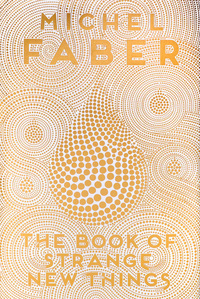Carolyn Percy reviews The Book of Strange New Things by Michel Faber about the romance and heartbreak that comes with every relationship.
Hogarth, 500pp
 Christian pastor Peter Leigh and his wife Bea are driving down the dark and lonely motorway towards Heathrow, where a plane will take him to America and the job opportunity of a lifetime. But beneath the anticipation is a melancholic tension, an unmentionable elephant in the room; for not only is it the first time this husband and wife team are to be separated, there is a very real chance they will never see each other again.
Christian pastor Peter Leigh and his wife Bea are driving down the dark and lonely motorway towards Heathrow, where a plane will take him to America and the job opportunity of a lifetime. But beneath the anticipation is a melancholic tension, an unmentionable elephant in the room; for not only is it the first time this husband and wife team are to be separated, there is a very real chance they will never see each other again.
The Book of Strange New Things leaves the omniscient narration and historical setting of Faber’s Victorian epic, The Crimson Petal and the White, behind, providing us instead with a more intimate first person narration, and returning to the Science Fiction of earlier novel Under the Skin; only whereas then it was the aliens who had come to earth, this time it’s humanity who are the aliens.
Peter is recruited by the shadowy USIC – a global megacorporation with many fingers in many pies but no clear purpose – to be pastor to the indigenous population of ‘Oasis’ – a newly discovered planet at the furthest reaches of space that USIC is in the tentative first stages of colonising – who are strangely eager for the teachings of Christ and the Bible – the aforementioned ‘book of strange new things’. This is not, however, a story about organised religion’s ideological destruction and assimilation of another culture, nor is it a polemic or a simple denouncement; it’s not even a Science Fiction thriller about the human colonisation of another planet. The Book of Strange New Things is a book, first and foremost, about communication: how do you begin to communicate with a species so far removed from our own, whose throats aren‘t even designed to speak like ours? One of the brilliant little devices Faber employs is to occasionally intersperse the dialogue of the Oasans – who are, incidentally, one of the most original alien species I’ve come across in fiction: in an era of prolific exposure to Sci-Fi, it can be difficult to come up with anything new, but I think to say that Faber has managed to is a reasonable claim – with the strange symbols of their own language. These symbols remain untranslated; different beings can work to adapt to the others’ dissimilarities but some things will always remain unknowable.
Peter and Bea’s only means of communication on Oasis is a device called the ‘Shoot’ – a sort of very long range e-mail device. Absence may make the heart grow fonder, but as their experiences – already so far removed from each other – begin to transcend their ability to communicate them, so too does the distance between them become an emotional as well as physical one. The USIC base personnel are a mostly uncommunicative lot, deliberately chosen for their lack of ties to home and happily wrapped up in their individual professions, and USIC themselves, like a lot of big corporations, are practised at withholding and censoring information.
The book’s portrayal of Christianity and its practitioners are truly a breath of fresh air: both Peter and Bea are likeable and sincere despite being flawed and the relationship between them is genuinely touching. Both have come to Christianity through difficult circumstances: Peter through a youth full of drug and alcohol abuse and Bea through what is heavily hinted to have been an abusive childhood. They don’t consider themselves superior to anyone else and are not immune to doubt. Agnostics, atheists and believers alike should be able to find something to enjoy in this book.
Faber has said in interviews that it is highly likely The Book of Strange New Things will be his last novel, feeling that he has created as many novels that are original and different from each other as possible. One hopes this isn’t the case, but if it is, what a brilliant note to go out on: definitely not a whimper but a bang.










